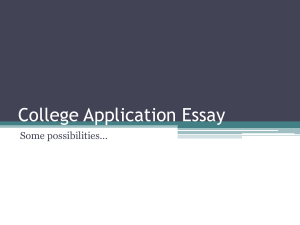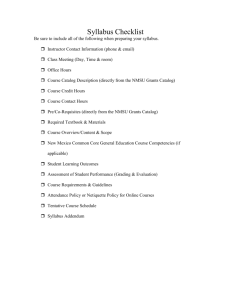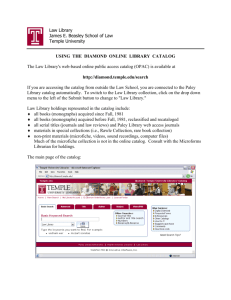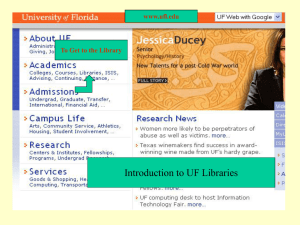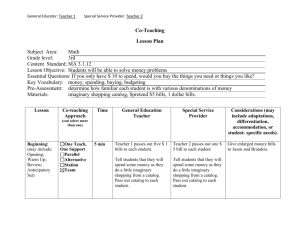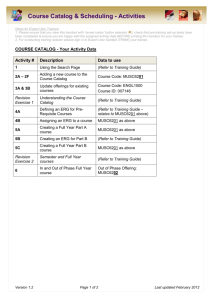Information Literacy Quiz: Test Your Skills
advertisement
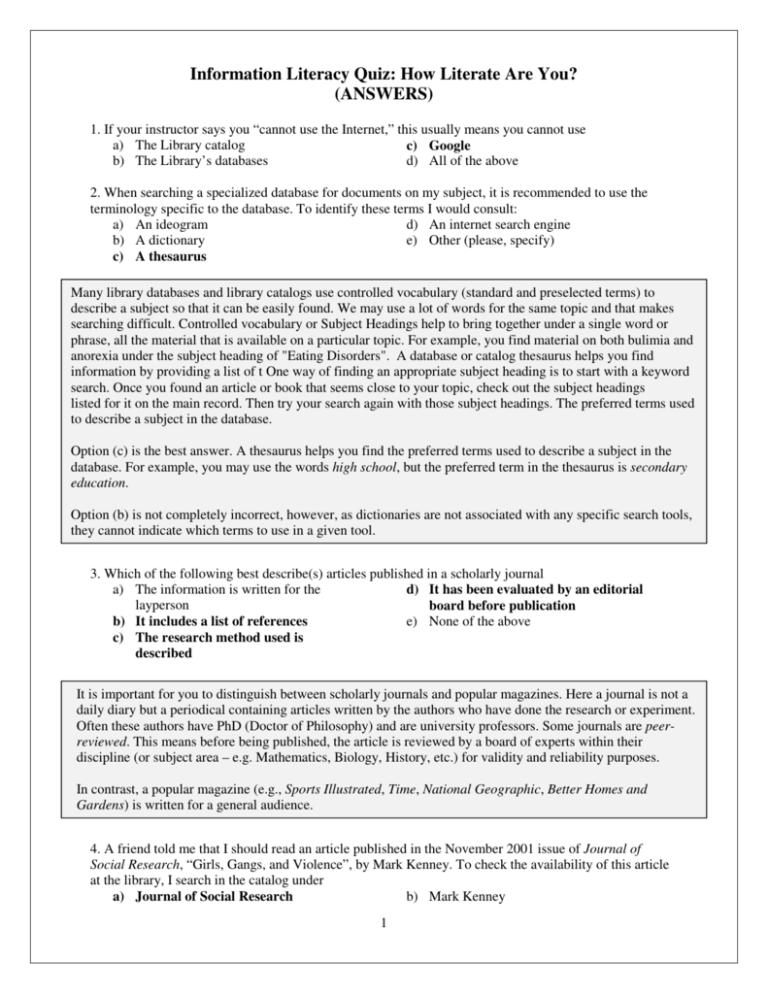
Information Literacy Quiz: How Literate Are You? (ANSWERS) 1. If your instructor says you “cannot use the Internet,” this usually means you cannot use a) The Library catalog c) Google b) The Library’s databases d) All of the above 2. When searching a specialized database for documents on my subject, it is recommended to use the terminology specific to the database. To identify these terms I would consult: a) An ideogram d) An internet search engine b) A dictionary e) Other (please, specify) c) A thesaurus Many library databases and library catalogs use controlled vocabulary (standard and preselected terms) to describe a subject so that it can be easily found. We may use a lot of words for the same topic and that makes searching difficult. Controlled vocabulary or Subject Headings help to bring together under a single word or phrase, all the material that is available on a particular topic. For example, you find material on both bulimia and anorexia under the subject heading of "Eating Disorders". A database or catalog thesaurus helps you find information by providing a list of t One way of finding an appropriate subject heading is to start with a keyword search. Once you found an article or book that seems close to your topic, check out the subject headings listed for it on the main record. Then try your search again with those subject headings. The preferred terms used to describe a subject in the database. Option (c) is the best answer. A thesaurus helps you find the preferred terms used to describe a subject in the database. For example, you may use the words high school, but the preferred term in the thesaurus is secondary education. Option (b) is not completely incorrect, however, as dictionaries are not associated with any specific search tools, they cannot indicate which terms to use in a given tool. 3. Which of the following best describe(s) articles published in a scholarly journal a) The information is written for the d) It has been evaluated by an editorial layperson board before publication e) None of the above b) It includes a list of references c) The research method used is described It is important for you to distinguish between scholarly journals and popular magazines. Here a journal is not a daily diary but a periodical containing articles written by the authors who have done the research or experiment. Often these authors have PhD (Doctor of Philosophy) and are university professors. Some journals are peerreviewed. This means before being published, the article is reviewed by a board of experts within their discipline (or subject area – e.g. Mathematics, Biology, History, etc.) for validity and reliability purposes. In contrast, a popular magazine (e.g., Sports Illustrated, Time, National Geographic, Better Homes and Gardens) is written for a general audience. 4. A friend told me that I should read an article published in the November 2001 issue of Journal of Social Research, “Girls, Gangs, and Violence”, by Mark Kenney. To check the availability of this article at the library, I search in the catalog under b) Mark Kenney a) Journal of Social Research 1 c) Girls, Gangs, and Violence d) Answers (a), (b), and (c) are correct e) Other (please, specify) The catalog does not index individual journal articles, and as a result, one cannot search by author or by article title. The only access point is the journal title. 5. If I want to find scholarly journal articles about the impact of global warming I will search in: CIRCLE only ONE answer d) The journals in the Library a) The Library catalog e) Other (please specify) b) A database c) Google The best answer is (b) because the search tool that enables one to search for journal articles is the database. It is possible to browse journals in the library (d) in the hope of finding one or more relevant articles, but this is not an efficient search strategy. The answer “Google” (c), is also a poor choice. While Google does provide links to certain electronic journals and magazines, you still have to browse the Web site to find articles on your topic. The library catalog (a) does not index journal articles. 6. Among the characteristics that are used to evaluate the quality of an Internet site one finds: d) The site is rapidly accessible a) The date of publication is provided e) None of the above b) The author is known in the field c) Responsibility for the site is clearly indicated Options (a), (b), and (c) are the best answers. The author’s credentials, the age of the information, and the organization or company on whose website the article or page resides are important factors to consider when judging whether or not the information is reliable and valid. Option (d), although desirable, is not an important factor in determining the quality of the information on the Internet site. 7. Some of the items that can be found in the library catalog include: c) All the titles of the articles found in the a) All the titles of the books available in journals available in the library the library b) All the titles of the books available on d) All the titles of the journals available the market in the library e) None of the above Option (a) and (d) are the only valid choices for this question, as the books and journals available in indeed included in the library catalog. The catalog enables you to find out the documents available at the University of Hawaii campus libraries (whether in print, audiovisual, or electronic format). 2 8. You have found magazine article and Web pages presenting different views on a current issue. You want to use this information to write your paper. In which case(s) do you need to include a reference to the source of information? a) When I copy word for word a c) When I write in my own words what paragraph from the magazine article is being said in a magazine article b) When I copy word for word a d) When I write my own words what is paragraph from a Web page being said in a Web page e) In none of the above cases Options (a), (b), (c), and (d) are the best answers. When repeating someone’s words or opinions, it is important to mention the author of the original text so the reader may refer to the text. Repeating the text word for word or paraphrasing or simply using a few words without documenting the source is plagiarism. You need to quote sources when paraphrasing (putting your own words) 9. In order to find more documents on my topic I can include synonyms in my search statement. To connect those synonyms in my statement, I use: a) AND d) OR b) + e) Other (please, specify) c) NOT The terms AND, OR, and NOT are called Boolean operators. With synonyms or related terms, the search operator to use is OR. OR is used to find all the documents that include one or several of the search terms or all of the terms (e.g., lions OR tigers OR bears). Documents retrieved can contain one term only, two out of three, or all terms. OR broadens the search and increases the number of documents. A greater number of terms connected with OR will generate a greater number of results. For example, lions OR tigers OR bears finds In contrast, AND is used to retrieve documents that include all of the search terms. Documents retrieved must have all the terms. AND narrows the search and as a result, it limits the number of documents that can be retrieved. You will find fewer documents with AND then OR. NOT is used to retrieve documents that include one or more of the search terms while excluding some from the search results documents that include a specific search term. For example, Nixon NOT Watergate finds documents on Nixon but excludes those containing the term Watergate. The + symbol is used by some search engines to represent the Boolean operator AND. 10. If I want to find journal articles about “The popularity of video games,” I will search in a) The library catalog c) Google d) The journals in the library b) A database The best answer is (b) because the search tool that enables one to search for journal articles is the database. It is possible to browse journals in the library (d) in the hope of finding one or more relevant articles, but this is not an efficient search strategy. The answer “Google” (c), is also a poor choice. While Google does provide links to certain electronic journals and magazines, you still have to browse the Web site to find articles on your topic. The library catalog (a) does not index journal articles. 3 11. To find all the documents about Edgar Allan Poe in the library catalog, I would do a search a) By title d) By author b) By publisher e) Other (please, specify c) By subject A good search strategy requires an understanding of the structure and content of the fields in a library catalog or database in order to select the appropriate search indexes when executing the strategy. Choice (c) is the best answer. A subject search in the library catalog will find the documents about Edgar Allan Poe. Choice (d) will find the texts written by Edgar Allan Poe, but not documents about him. 12. A friend of mine told me that I should read an article by John Broome about the ethics of climate change in the June 2008 edition of Scientific American. To check the availability of this article in the Library, I search in the catalog under: CIRCLE only ONE answer c) The Ethics of Climate Change a) Scientific American b) John Broome d) Answers (a), (b), and (c) are correct The catalog does not index individual journal articles, and as a result, one cannot search by author or by article title. The only access point is the journal title. 13. You must use a psychology database to find information on “The effect of family relations on the academic results of primary school students.” Which combination of words will you use? d) Effect, family relations, academic a) Family relations, academic results, results, primary school primary school b) Family relations, academic results e) Other (please ,specify) c) Effect, family relations, academic results An effective search strategy requires you to distinguish between significant terms and non-significant or meaningless words. You must include all the appropriate terms. Choice (a) is the best answer because it includes the three significant concepts in the original question. Choice (b) does not include the “primary school” concept. This search will find more documents, but some will not be relevant because they will deal with academic results in high school and higher education. Choices (c), (d), and (e) contain the non-significant term “effect.” The inclusion of non-significant words reduces the number of results obtained. The best search distinguishes between significant and nonsignificant terms. 4 14. Which one of the following citations refers to a journal article? a) Miller, A.W. (1997). Clinical disorders and stressful life events. Madison, CT, International University Press. b) Anderson, K.H. (1999) “Ethical dilemmas and radioactive waste: A survey of the issues.” Environmental Ethics, 2(3):37-42. c) Hartley, J.T. & D.A. Walsh. (2000). “Contemporary issues and new directions in adult development of learning and memory”, in L.W. Poon (ed.), Aging in the 1980s : Psychological Issues, Washington, D.C., American Psychological Association, pp. 239-252. d) Maccoby, E.E. & J Martin. (1983). “Socialization in the context of the family: Parent-child interaction,” in P.H. Mussen (ed.), Child psychology: Socialization, personality, and social development. New York, Wiley, vol. 4. Pp. 1-101. Option (b) is the correct answer. The journal article citation has an author (Anderson, K.H.; a publication date (1999); an article title (Ethical dilemmas and radioactive waste: A survey of the issues); a journal title (Environmental Ethics), a (volume number (2); an issue number, (3), and page numbers (37-42). Distinguishing features of a journal article include a title that is often underlined or in italics, for example, Environmental Ethics. Journals often contain a volume and sometimes, an issue number: The date is sometimes a year, sometimes month and year, sometimes season (example: Spring) and year. Choices (c), (d), and (e) contain the non-significant term “effect.” The inclusion of non-significant words reduces the number of results obtained. The best search distinguishes between significant and nonsignificant terms. 15. In order to become familiar with a subject about which I know very little, first I consult a) A journal c) A database d) A book b) An encyclopedia Option (b) is the best choice. Encyclopedias provide you with a quick overview of a topic. Encyclopedias can be general (on any topic – think Wikipedia or Britannica) or specialized (or Encyclopedia of Mathematics, Encyclopedia of Life Support Sciences) Option (a), a journal, generally deals with a specific aspect of a topic and does not provide an overview. Option (c) is used to find references to various types of documents (e.g., articles, books, films, etc.) Option (d) may provide an introduction to a subject, but often contains much more detail information than an encyclopedia and cannot be used as a quick reference. If you chose option (e) and answered “the Internet,” this approach lacks precision and may not be very efficient because of the multitude of document types found on the Internet. 5 16. Using a metasearch engine such as Ixquick or Dogpile, it is possible to: a) Launch a search in many search engines simultaneously b) Execute a search in all the existing Web sites c) Extend the search into foreign language Web sites d) Execute the search in all the databases available in the library Option (a) best characterizes internet search engines. A metasearch engine enables you to search several search engines at the same time. If you chose option (e) and answered “the Internet,” this approach lacks precision and may not be very efficient because of the multitude of document types found on the Internet. 17. You have to write a paper on the “Treatment of depression”. Which strategy will find the least number of documents? a) Depression AND psychotherapy b) Depression OR psychotherapy OR antidepressants c) Depression AND psychotherapy AND antidepressants d) Depression e) Other (please, specify) OR broadens searches. AND limits searches. Choice (c) will retrieve the smallest number of documents. Choice (d) contains only one term. Note, you might think the fewer words there are in a search, the fewer results there will be. This strategy, however, will produce many more results than option (c). Option (b) would retrieve the most documents (OR expands the search). 18. You must make an oral presentation on the topic “Measures currently used across the country to decrease the damage to the natural environment”. Among the following choices, which one describes best the ideas contained in your subject? a) Damage to the natural environment, United States b) Measures currently used, country c) Damage, environment, measures currently used d) Protective measures, environment, United States e) Other (please, specify) f) Don’t know An effective search strategy sometimes requires you to use different search terms than the ones used in the statement of the problem. Choice (d) includes all the concepts. In choices (a) and (c), an important concept is missing. Sometimes the words you use to describe your topic do not correspond to those used by the search tool (e.g., you use “damage to the natural environment” but the database or catalog uses “protective measures.” Additionally, although “country” is an important concept, it needs to be translated into a more significant and precise words for the search. 6 19. Using a search engine such as Google to search documents on “The depletion of the ozone layer and the impact on health”, I use the words a) Impact, depletion, ozone layer, health d) Skin cancer, ozone layer e) Other (please, specify) b) Ozone layer, health c) Ozone layer An effective search strategy requires you to distinguish between significant terms and non-significant or meaningless words. The inclusion of non-significant words reduces the number of results obtained, while the omission of significant words renders the strategy too broad and will retrieve irrelevant results. Choice (b) is the best answer. It includes the significant concepts. Choice (a) includes all the words in the statement – impact – depletion – ozone layer – health. However, the term “impact” is not significant and is likely to be overly restrictive. Choice (c) is too broad. It does not include an important concept – health. Choice (d) “skin cancer, ozone layer” is also overly restrictive. Cancer is only one of many effects of ozone layer depletion. 20. To find the most recent information about drug abuse, I consult: a) A book c) An encyclopedia b) A journal d) Other (please, specify) Periodicals (a magazine or journal that is issued at regularly recurring intervals) contain more recent information than other document types. If you chose option (e) and answered “the Internet,” you may not be distinguishing between the different types of documents available on the Web (books, encyclopedias, reports, press releases, dictionaries, articles, etc.). Many students consider the Internet to be a document type although, in fact, it is a means of disseminating information much the same as print. This “all-purpose” approach has problems, because the quality, reliability, and currency of information on the Internet varies greatly. . It does not include an important concept – health. Choice (d) “skin cancer, ozone layer” is also overly restrictive. Cancer is only one of many effects of ozone layer depletion. 21. You have found a book that is right on your topic. Which section of the book will you consult to find other documents on the topic? a) The glossary d) The table of contents b) The index e) Other (please, specify c) The bibliography The bibliography is a tool for finding other documents. 7 22. You have used the words “business letters” in a library catalog search. No document is found by the computer. What do you conclude? a) The library does not have any c) All documents on this topic are already documents on this topic on loan d) The system is down b) I have not used the right words Sometimes the words you use to describe your topic do not correspond to the words used in the library’s catalog or databases. When you obtain few or no results, you should (1) verify you spelled the words correctly, and (2) try to identify the preferred search terms in the catalog or database you are using the subjects or database thesaurus Although choices (a), (c), and (d) are possible, they are less likely and therefore not the best or preferred first answer. 23. Using a search engine such as Google or Bing, I would not find: c) Merchandise catalogs a) The books available in the library b) Biographical information about famous d) Information about companies people e) Other (please, specify) General Internet search engines are not appropriate tools for finding documents (articles, books, films, etc.) owned by the library. Although it is possible to find the library catalog using a search engine such as Google, search engines do not enable one to directly access titles within the catalog. 24. Examples of primary sources include: CIRCLE all that apply a) Diary of Anne Frank - Experiences of a Jewish family during WWII b) The Constitution of United States c) A journal article reporting NEW research or findings d) A dinosaur’s skeleton e) None of the above Options (a), (b), (c), and (d) are all examples of primary sources. In cultural or historical studies, primary sources are original records that were either created at the time historical events occurred, or well after those events in the form of memoirs and oral histories. In literary studies, primary sources include original literary works plus letters, diaries, notes, and marginalia written by authors. In scientific research, primary sources include articles reporting on the results of original research, plus the data gathered by scientists. Some examples include: letters, manuscripts, literary works, diaries or journals, newspapers, speeches, interviews, memoirs, government documents, photographs, audio/video recordings, original scientific research reports, research data, object or artifacts, 8 25. Zotero, a free software that you can download from the Internet, enables you to (CIRCLE all the apply a) Collect d) Cite e) None of the abov b) Organize c) Share Options (a), (b), (c), and (d) are all tasks you can do with Zotero software. 26. What Internet domain below is inaccurate? a) .com = commercial or for-profit business b) .org = non-profit organizations c) .gov = government organizations d) .edu = educational institutions e) .mil = million dollar organizations 27. When conducting academic research on the Internet, information from what type of sites are appropriate (Circle all that apply)? a) .com d) .edu b) .org e) .biz c) .gov In general, sites with a.edu or .gov domain are appropriate sources for academic writing. Sometimes .org sites are, but you must spend more time identifying the orientation, purpose, and credibility of .org sites. 28. You can plagiarize yourself a) Yes b) No Plagiarism isn't just about copying someone else's ideas, it's about claiming to do work that you haven't (think of this as fraud rather than stealing). If you are reusing your own work, but representing it as new work, that is plagiarizing yourself. In a sense, reusing a paper you wrote for English 100 in, say, History 200 is fraud because many instructors expect and want you to create new work for each class. Before resubmitting work you created for other classes, notify your instructor of your intention and get their permission. 29. The invisible Web is a) All the information on the World Wide Web that cannot be found using a general purpose search engine such as Google or Bing b) Estimated to be 500 times the size of the visible (surface) Web c) Composed exclusively of anonymous users d) Made up of Web sites with no author(s) The Invisible Web is all that information that you cannot find using general purpose search engines such as Google or Bing or for business or technical reasons. It is estimated to be 500 times larger than the Surface Web (the information you can find using general search engines). Adapted from: Diane Mittermeyer, Diane Quirion, Caroline Archambault, Pierre Carrier, Sharon Grant, Pierre Guilmette, Edith Healy, Madeleine Hébert-Erban, Patrick Labelle, Karen Nicholson, Madeleine Proulx, Diane Sauvé, Ruth Sheeran, and Danielle Tardif. 2003. "Information literacy: Study of incoming first-year undergraduates in Quebec" The SelectedWorks of Karen Nicholson, M.A., M.L.I.S. 9
